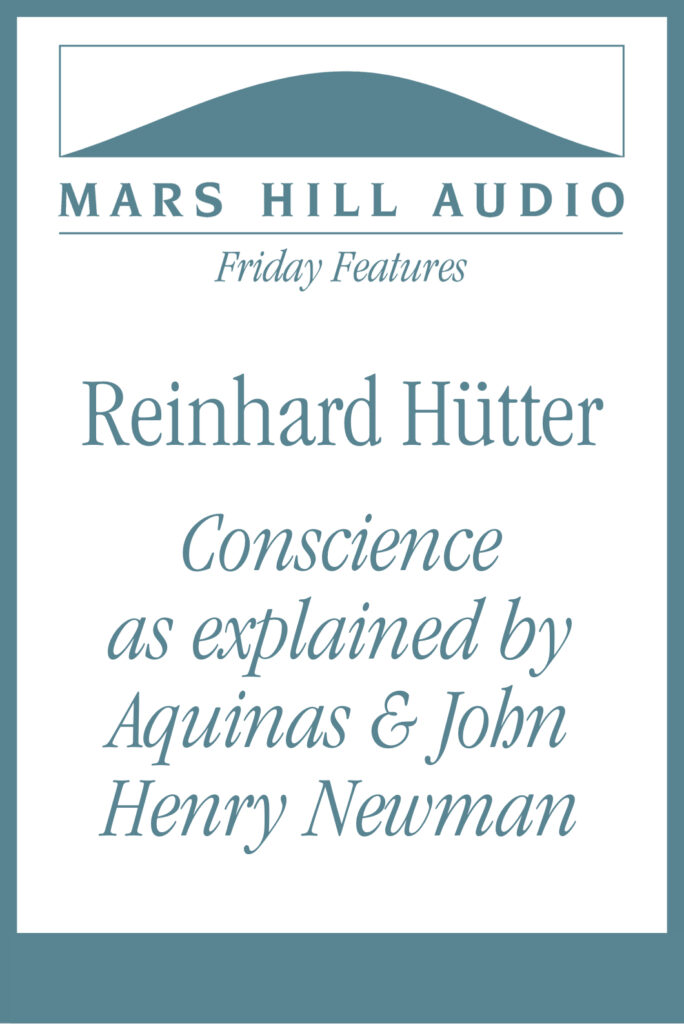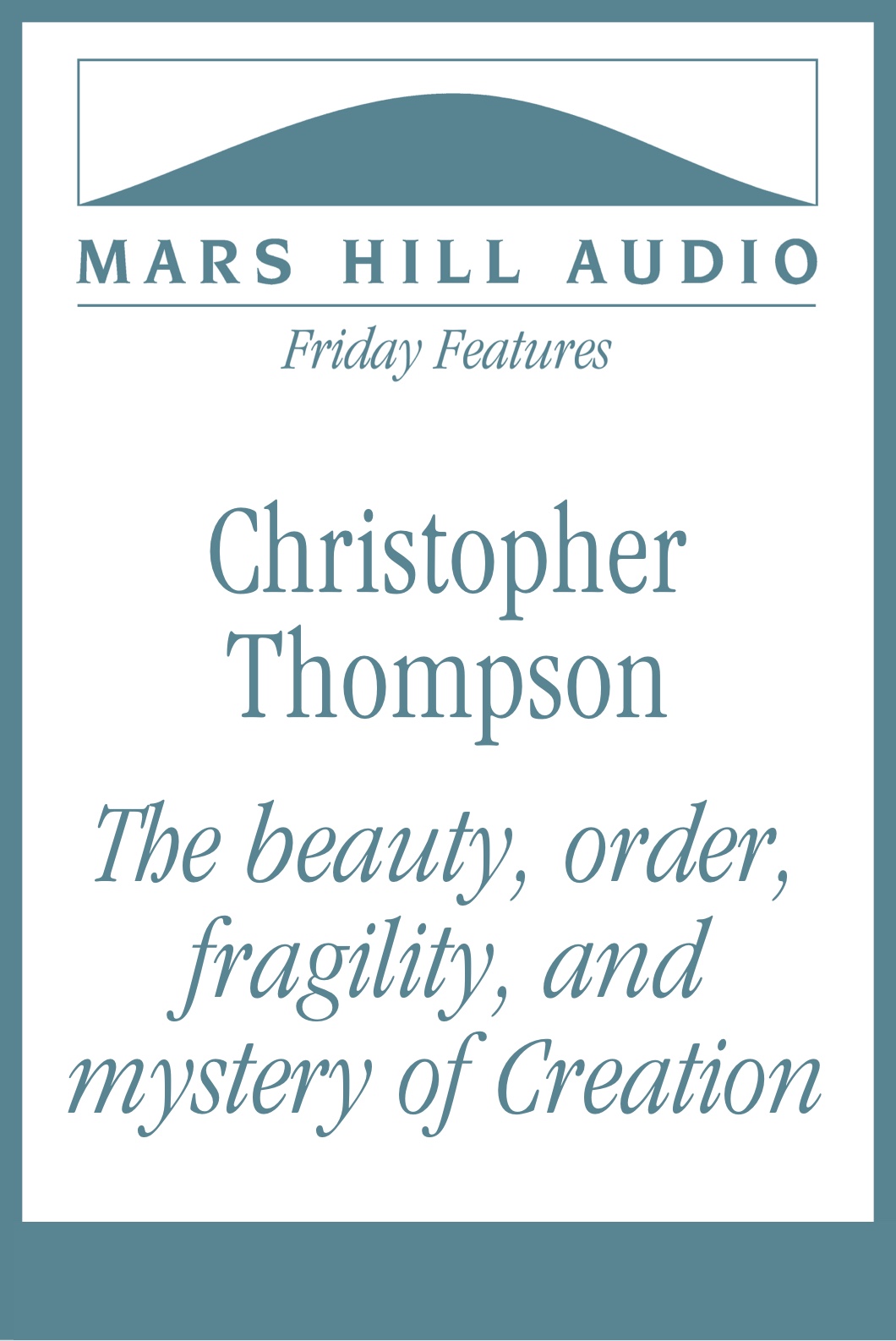released 10/20/2023
In his book John Henry Newman on Truth and Its Counterfeits (The Catholic University of America Press, 2020), theologian Reinhard Hütter argued that “the word conscience has come to stand for its counterfeit, denoting not the divine law impressed upon the human intellect but the decisions of the individual’s sovereign self-determination.” This Feature presents a lecture given in 2014 by Dr. Hütter titled “Freedom of Conscience as Freedom in the Truth: Conscience according to Thomas Aquinas and John Henry Newman.” Thanks to the Lumen Christi Institute in Chicago for permission to share this lecture with our listeners.
64 minutes
PREVIEW
The full-length track for this audio is only available to paid members and to listeners with a free Visitor’s Pass. If you are a member, log in here. If you would like a Visitor’s Pass, sign in here. You may purchase one of our complete memberships here. Happy listening!
More to hear . . .
In his book The Joyful Mystery, Christopher Thompson calls for “a renewed and robust vision of the created order” capable of moving beyond punditry and pronouncements about caring for the Earth. “Inspired by St. Thomas, Green Thomists insist, among other things, that the human person is an embodied, spiritual creature dwelling in a cosmos of created natures, intelligently ordered by God and capable of being intelligibly grasped by human reason; they insist that this wisdom of creation is something prior to us, given by God and discovered through intelligence; and they insist that despite original sin, the original wisdom of the Creator still permeates creation and provides norms for its care as well as human flourishing.”
This feature is available to listeners with a Mars Hill Audio membership.
Related reading and listening
- It takes a character (and a village) — Herbert McCabe, O.P. on the Aristotelian, Thomistic, and MacIntyrean account of the moral life
- Flannery at 100 — In honor of Flannery O’Connor’s 100th birthday, we have gathered here an aural feast of interviews with O’Connor scholars and aficionados discussing her life, work, and faith. (3 hours, 28 minutes)
- Discipline and piety — Bishop Robert Barron on Aquinas, the man
- St. Thomas the anthropologist — G. K. Chesterton on Aquinas’s complete Science of Man
- The collaboration of bodies and minds — F. C. Copleston on Aquinas’s confidence in the embodied nature of knowledge
- A brief for “prophetic Thomism” — David Decosimo on assuming a charitable posture toward pagan virtue
- Insights from St. Thomas’s biblical exegesis — Jason Paone explains how St. Thomas’s commentaries reveal the saint’s personality, his rhetorical flair, and the Christocentric vision that underlie all his work. (24 minutes)
- Economics and personhood — FROM VOL. 147 Mary Hirschfeld argues that modern economics makes some fundamental assumptions about personhood, material goods, and God that prevent the development of a truly human understanding of economic life. (20 minutes)
- Metaphysics and sub-creation — FROM VOL. 144 Jonathan McIntosh claims that scholarship has tended to ignore the depth of St. Thomas Aquinas’s influence on J. R. R. Tolkien’s work. (28 minutes)
- The need to recollect ourselves as whole persons — In this 2016 lecture, John F. Crosby explores key personalist insights found in the thinking of John Henry Newman and Romano Guardini. (60 minutes)
- Goodness, truth, and conscience — David Crawford examines Karol Wojtyła’s thought on the relationship between conscience and truth. (37 minutes)
- Mars Hill Audio Journal, Volume 162 — FEATURED GUESTS: Mark Noll, R. Jared Staudt, Paul Weston, William C. Hackett, Hans Boersma, and David Paul Baird
- “A society of friends at work” — Political philosopher Andrew Willard Jones lays out a robust vision for a just society in which virtues are formed in an analogical manner through relational obedience and trust. (71 minutes)
- Prudence in politics — FROM VOL. 146
Henry T. Edmondson, III talks about Flannery O’Connor’s understanding of political life, which was influenced by a range of thinkers including Aristotle, Thomas Aquinas, Eric Voegelin, and Russell Kirk. (19 minutes)
- The artist’s commitment to truth — Fr. Damian Ference, author of Understanding the Hillbilly Thomist, explores the depths to which Flannery O’Connor was steeped in Thomistic philosophy. (18 minutes)
- Flannery O’Connor and Thomistic philosophy — Fr. Damian Ference explores the depths to which Flannery O’Connor was steeped in Thomistic philosophy, as evidenced by her reading habits, letters, prayer journal, and, of course, essays and fiction. (48 minutes)
- What does it mean to be a creature? — Canon-theologian Simon Oliver explains how and why the doctrine of Creation is cardinal and must frame all theology. (62 minutes)
- Hütter, Reinhard — FROM THE GUEST PAGE: Professor Reinhard Hütter’s primary field of study is systematic and philosophical theology with a focus on faith and reason, revelation and faith, dogma and history, on questions of theological anthropology (freedom and grace) and the doctrine of God.
- The theonomic nature of conscience — Matthew Levering on Reinhard Hütter’s description of conscience: “Real conscience does not give free rein to a person’s desires.”
- The aboriginal Vicar of Christ, the voice of God in the heart of Man — Reinhard Hütter on John Henry Newman’s insistence that conscience — rightly formed — bears witness to the law of God
- Maintaining a connected grasp of things — Ian Ker summarizes the central concern of John Henry Newman’s educational philosophy as developed in The Idea of a University
- The university and the unity of knowledge — Biographer Ian Ker discusses John Henry Newman’s understanding the goal of “mental cultivation.” (17 minutes)
- Conscience seared with a red-hot iron — Oliver O’Donovan on the convicting role of a good conscience
- Mars Hill Audio Journal, Volume 158 — FEATURED GUESTS:
David Setran, Vigen Guroian, Michael Dominic Taylor, Thomas Pfau, Jason Paone, and Matthew Levering
- Teachers and Learners — Ian Ker shares John Henry Newman’s ideals of learning, and Mark Schwehn discusses the virtues of good teachers. (27 minutes)
- The light shines in the darkness — Physicist David Park explores the physical, aesthetic, and spiritual aspects of light, considering the phenomenon of light in profound ways, from spiritual meanings embedded in our culture to the challenging questions put forth by great scientists and philosophers. (17 minutes)
- “A roaming unrest of the spirit” — Theologian Reinhard Hütter argues that the contemporary plague of pornography is a symptom of a deep spiritual apathy. (28 minutes)
- The final purpose for human beings — Theologian Hans Boersma argues that the beatific vision described throughout scripture is foreshadowed in “this-worldy experiences,” and that, particularly because of the Incarnation, eschatological experience is not only something in the future somewhere else, but is in fact connected with historical experience. (20 minutes)
- The eclipsing of happiness — Reinhard Hütter on the Christian recognition that happiness is only intelligible in light of the end for which we were created
- The scantily clad public square — Reinhard Hütter on the necessity of the virtue of religion
- Mars Hill Audio Journal, Volume 149 — FEATURED GUESTS:
Dru Johnson, Steven L. Porter, Reinhard Hütter, Matthew Levering, David Lyle Jeffrey, and Christopher Phillips
- The problem of a degenerate electorate — Aquinas, Augustine, and Aristotle on good government, as summarized by Reginald Garrigou-Lagrange
- Guarding our tongues — John Henry Newman on the manner of speech fitting for Christian faithfulness
- Mars Hill Audio Journal, Volume 147 — FEATURED GUESTS:
R. Jared Staudt, Jason Peters, D. C. Schindler, Craig Gay, Mary Hirschfeld, and Patrick Samway
- Stephen Gurney: “John Henry Newman: The Poetics of Devotion” — Stephen Gurney shows how in his sermons, John Henry Newman draws the listener in through the craft and beauty of his prose while nonetheless removing himself from the spotlight in order to convey his listeners to the True Presence of Christ. (51 minutes)
- Mars Hill Audio Journal, Volume 144 — FEATURED GUESTS:
Jonathan Mcintosh, Kevin Vost, Malcolm Guite, R. David Cox, Grant Brodrecht, and Peter Bouteneff
- St. Thomas and the wisdom of Creation — Christopher Thompson offers a renewed vision of “the human person [as] an embodied, spiritual creature dwelling in a cosmos of created natures, intelligently ordered by God and capable of being intelligibly grasped by human reason.” (16 minutes)
- Hillbilly Thomist: Flannery O’Connor and the Truth of Things — Susan Srigley and Ralph Wood examine Flannery O’Connor‘s sacramental fiction and her understanding of the wisdom of limits. (60 minutes)
- The Word Made Scarce — Barry Sanders discusses teaching in the age of technology, the effects of literacy on society, and the links between illiteracy and violence. (54 minutes)

